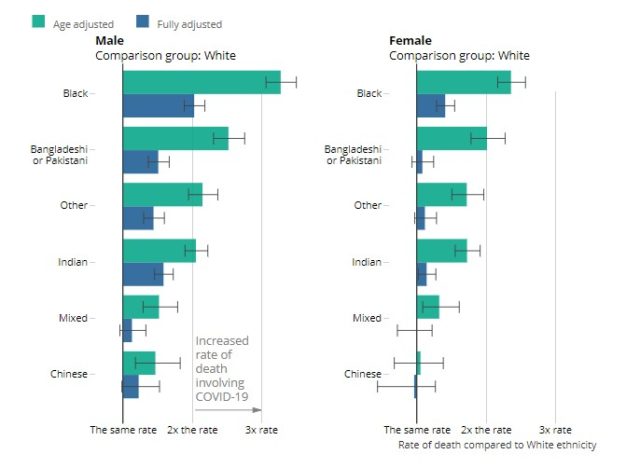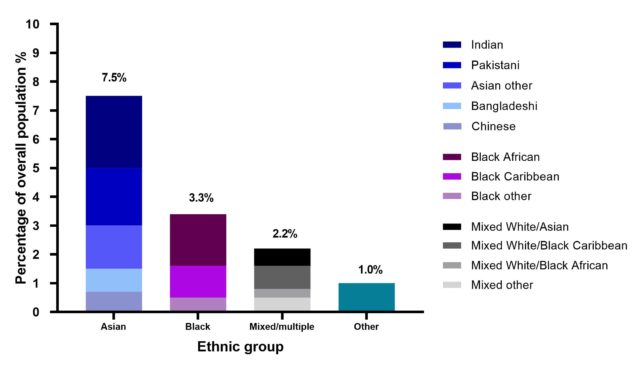COVID-19 is disproportionately affecting people from ethnic minorities in the UK and other high‑income countries, exposing longstanding inequalities for minority and marginalised communities. These disparities have been particularly evident in the UK, where Black, Asian and Minority Ethnic (BAME) communities are bearing the brunt of the pandemic. An official inquiry commissioned by the UK government identified that the risk of dying from COVID-19 is substantially higher in people from BAME groups than those from White ethnic groups, with the highest mortality rates seen among people from Black and Asian backgrounds. Black men and women in the UK are around two to three times as likely to die from COVID-19 than their White counterparts (Figure 1). Racism and discrimination suffered by BAME communities has been noted as a key factor behind the disproportionate impact of COVID-19 in the UK, although this has been downplayed.

Around 14% of the UK belong to a Black, Asian, Mixed or other ethnic group, a figure that rises to 40% in London. Figure 2 shows the breakdown of ethnic groups in England and Wales. People from BAME groups also make up a much higher proportion of key workers than the general population in the UK, putting them at the forefront of public health crises like COVID‑19. Intersecting factors such as socio‑economic deprivation, access to health services and racism and discrimination have all been identified as contributing to the health inequalities faced by ethnic minorities in the UK. COVID-19 is exacerbating these existing inequalities and unsurprisingly, similar factors are noted as contributing to the disproportionate effect of COVID‑19 among ethnic minorities in the USA.

As the pandemic shows no signs of disappearing, there is an urgent need to understand and address factors underlying the disproportionate effect of COVID-19 among ethnic minorities, before these communities are failed further. One area that has been neglected to date is qualitative research to capture information about the experiences of people from ethnic minorities who have had COVID-19 in countries where the disparities have been the greatest. A particularly important question is whether there are barriers to care that are worsening outcomes – are people from ethnic minority backgrounds less likely to be diagnosed and receive timely, appropriate treatment for COVID-19? Anecdotal evidence to date suggests this may be the case and highlights that additional research is needed.
To find answers to these questions, UK-based researcher Dr Michelle King-Okoye has founded a global consortium of multidisciplinary researchers to understand and address factors underlying the severe impact of COVID-19 among ethnic minorities, focusing on qualitative research. The Ethnicity and COVID-19 Research Consortium will first look at the lived experiences of ethnic minorities with COVID-19 and barriers to care. A systematic review of the reported symptoms, help-seeking accounts, and diagnosis/treatment-subjective experiences of ethnic minorities with COVID-19 in high‑income countries is currently underway, with results expected in September. An accompanying mixed-methods study to address the gap in qualitative research will examine barriers to testing, diagnosis and treatment of COVID-19 for ethnic minorities in high-income countries through surveys and qualitative research. Further information about the group’s ongoing and planned research can be found here.
COVID-19 has laid bare the bleak and unacceptable health inequalities for ethnic minorities. Addressing these inequalities needs to be a public health priority and momentum must not be lost in seeking to rectify these disparities. Global, collaborative research will be essential to untangle the causes of health inequalities for ethnic minorities in different countries and drive changes in policy and leadership that can improve outcomes for those from ethnic minorities with COVID-19. The Ethnicity and COVID-19 Research Consortium aims to be an important part of this research alongside other endeavors to address racial and ethnic disparities in the impact of COVID-19.
About the authors:
Dr King-Okoye is an alumna of the University of Surrey and a researcher affiliated with IGDORE. Her research has focused on health inequalities and pathways to care utilising a culture and ethnicity lens. Talya Underwood is a researcher and medical writer specialising in infectious diseases and global health.
The Ethnicity and COVID-19 Research Consortium is a newly established group of international, multidisciplinary researchers seeking to examine why people from ethnic minority backgrounds are being severely affected by COVID-19. The group are actively seeking financial support and additional research collaborations to continue their work, and any offers of assistance will be gratefully received.
Competing interests:
Dr King-Okoye and Talya Underwood do not have any disclosures.